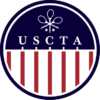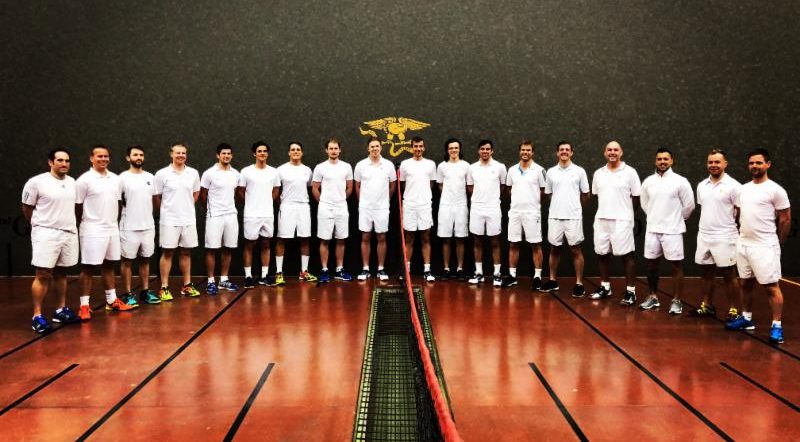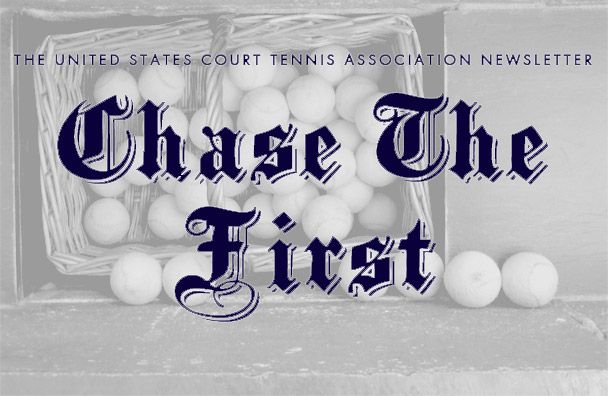Georgian Court; double tournament point. What could be better?
Indeed, what is nicer than a return to old Georgian Court and play on arguably the most special court in the country? In a springtime shower, the George Wesley Bellows oak tree still droops outside the Casino. The lions still loom in the gloaming distance. The green velvet binding still hangs around the net cord. The little wooden box still sits in the last gallery, so that Jay Gould—or the contemporary player—can serve multiple railroads without returning to the dedans. And the old admonishment is still on the wall above the dedans: “Silence Is Requested While The Ball Is In Play.”
Silence, more or less, was all we heard there for decades. The court was built in 1899 at the family estate of George Gould, and was the place where his son Jay Gould learned the game. The court, however, lay dormant after the estate was sold in 1924 to Georgian Court University, a nearby Catholic women’s college, until Ed Hughes and Barry Toates resuscitated it in 1982. Among other events, they started a tournament, the Jay Gould Cup, which after a few years left Lakewood for more active climes. A quarter century later and the court, fully renovated, was finally ready to receive the tournament back home.
Ten teams entered the 2009 Jay Gould Cup. We had a revised format: the Jay Gould is now the Etchebaster for doubles, a tournament for novice players. Every club in the country was represented. Ages ran from eleven to seventy-four. Handicaps ran from forty to eighty-seven. All with the usual thirty-something players were middle schoolers, high schoolers, collegiate players, mothers and grandfathers.
Many Georgian Court University students (including the sophomore class president) and staff members came to watch. The local Gannett newspaper, the Asbury Park Press, sent a photographer and a writer to cover the tournament, as did the GCU. There were nice breakfasts and lunches at the court and a lovely dinner at a quaint hotel in Bay Head, a Jersey shoretown east of Lakewood.
The word novice was quite true for a couple of players. A trio of youngsters from Newport’s active junior program, played with their mothers; these boys, ages eleven, thirteen and fourteen, almost by definition have to be novices. But the adults had some inspiring tales. Gary Multer was down from Boston. Before picking up court tennis a couple of years ago, Gary had never played any racquet sport at all, not even once. How many court tennis players have never picked up a lawn tennis or squash racquet first? Even more amazing was Shirley Birch, a British native now in Newport who told me after her first match that it was just the third time she had ever been on a court.
With ten teams, it was decided to make the Jay Gould handicapped, which made for some fantastic matches. In the finals, Newport’s Justin Bartenbach & his mother Liz Bartenbach played against Jericho Seguin of Washington & Baird Standish of Philadelphia. The Bartenbachs snuck out a victory by the smallest margin possible, a 5-all, 40-all, no-ad double match and tournament point. It was one of those inevitable outcomes, a match that seemed inexorably headed towards that ultimate point. The Bartenbachs, playing a sizable handicap advantage, won the first set, faltered in the second and then scrambled back in the third.
The last two games were epic. Seguin, ahead 5-4, was laying down very fierce railroads in true Gouldian fashion, and Liz Bartenbach, an eighty-handicapper, was flummoxed. The game went to deuce, no-ad, match point for Seguin & Standish. Bartenbach barely managed to return a railroad. The ball rolled back along the service-side penthouse and then bounded onto the floor. Seguin, standing ready to smack it, elected to let it bounce off the back wall first. Instead, it hopped into the dedans. 5-5.
In the last game, it again went to deuce, no-ad, double championship point. The crowd was dead-quiet. Justin Bartenbach, a seventy-four handicap, was nervously serving. He faulted on the first serve. The crowd, ever hopeful that the boy did not double fault away the point, silently urged the schoolboy on. He hit a bobble serve that ran down the penthouse, in play but an easy ball for Baird Standish. Winding up, Standish slammed the ball at a tremendous speed towards the service side. It caught the tip of the velvet net cord and dropped dead into the net, on his side. The Bartenbachs had won.


